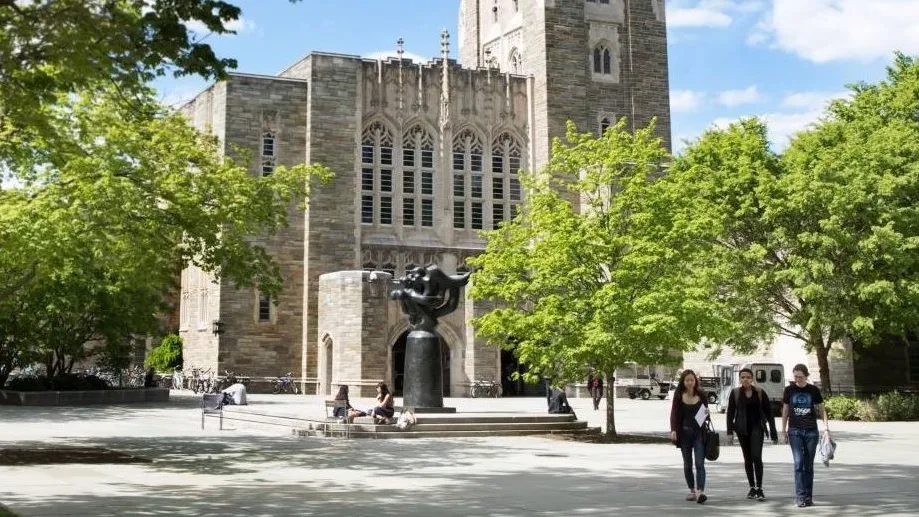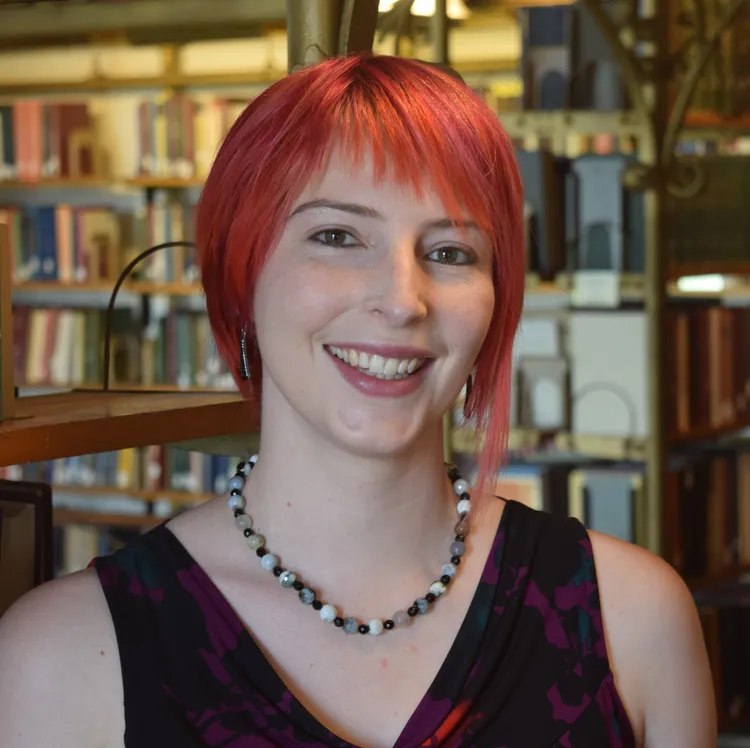Meet Our New RSE, Laure Thompson!
6 May 2024
Laure joined the CDH earlier this year as a Research Software Engineer.

Research Software Engineer Laure Thompson joined the CDH from the University of Massachusetts Amherst earlier this year.

Your undergraduate and graduate work is in computer science. How did you become interested in digital humanities?
By having an independent interest in the humanities. Although more seriously, I didn’t combine my interests in computer science and the humanities until relatively late in my academic career. However, I have had a long-standing interest in the classical period, and did a minor in classical studies by taking all the non-language-based courses I could during undergrad.
My first engagement with Digital Humanities was through a chance encounter: taking an NLP graduate course to complete degree course requirements during my PhD [at Cornell University]. Through the advice of a friend (medievalist), I reached out to David Mimno for advice for a NLP-related project with an ancient Mediterranean application. One thing led to another, and I became an advisee of David’s with a research focus on computational methods for the humanities & social sciences.
You also trained in classical archaeology in graduate school. How did you develop that interest, and how does it connect to your other work?
My PhD program had an external minor component which required me to have a committee member outside of the field of computer science. While this was often fulfilled by CS faculty members associated with closely related fields (e.g., math, applied math, electrical engineering), there was no requirement to do so. I came to Cornell knowing this and wanting a way to keep pursuing my interests in classics / ancient Mediterranean studies. Fortunately, Caitie Barrett (Department of Classics) agreed to join my committee even though my likely thesis topic would have little to do with classical archaeology.
In the beginning years of my PhD, I worked in the areas of theoretical programming languages, security, and systems, so at first, it didn’t relate to my research at all. But, after I switched to working with David, I did find a way to combine them and in such a way that Caitie could share her expertise. Specifically, one of my thesis chapters focused on how computer vision models might be leveraged to study and problematize the art historic category of magical gems.
What does your research focus on?
Broadly speaking, my research focuses on building tools and creating methodologies for studying humanities collections at scale. I particularly focus on understanding what models can learn and how we can change what they learn. My work centers measurements for interpretability as well data-centric interventions. I focus on interventions that a user of AI models can easily deploy: they occur outside of the model itself. This can occur in two ways: as a data curation step before the data is passed on as input to the model or as a post-hoc application to model’s output.
While I work with a wide range of collections and domains, two of my favorites are working with speculative fiction and magical gems. These domains are admittedly somewhat weird: one’s a popular fiction genre, the other is a niche art historic category of objects that are generally without known ancient contexts but with long post-antique histories. However, many of their peculiarities are desirable since they can test the limits of existing computational models and methods; while computational models and methods might also help us uncover new ways of viewing these materials and their entrenched categorizations.
While I work with a wide range of collections and domains, two of my favorites are working with speculative fiction and magical gems.
What projects are you working on at the CDH?
One of the projects I’m currently working on at the CDH focuses on applying text (and image) analysis to the Princeton Prosody Archive. Our primary goal is to identify poems and poem excerpts within PPA, so that we can study the trends of which poems are cited across time and for what purposes.
What are you looking forward to working on at the CDH?
I’m looking forward to being in a place that literally centers its focus on the digital humanities. This provides the opportunity to focus on research projects and directions that might not be possible in more disciplinary settings.
One exciting thing that has come up is that there are now several CDH staff with research interests in speculative fiction (Mary Naydan, Grant Wythoff, and myself). I’m looking forward to seeing what we might accomplish together!
Any favorite moments from your time at the CDH or at Princeton so far?
Shortly after I joined, the CDH winter retreat occurred. One of the things we did during the multi-day retreat was collectively craft a new mission statement. Despite having only joined a few weeks prior, I was able to actively participate. It was wild how easy it was to contribute and envision futures for the CDH, while at the same time being generally unaware of the institutional knowledge of CDH. Our shared focus on DH is what made this possible—we all inhabit the same interdisciplinary plane (even as we engage with different disciplinary communities).
Do you have a favorite DH project to share (yours or someone else’s)?
One memorable work that I return to again and again (especially for teaching) is Richard Jean So and Hoyt Long’s “Literary Pattern Recognition: Modernism between Close Reading and Machine Learning.” I think this article nicely highlights how machine classification can be used to view texts and categories from a different, “alien” perspective, as well as demonstrating how this method can be used in combination with other methods. This project asks a simple (or not so simple question) about what makes an English poem a haiku, but intentionally thinking beyond the simple (and reductive) 5-7-5 syllable rule.
It’s never too early or too late to engage with DH!
What advice would you give a student who wants to explore DH?
It’s never too early or too late to engage with DH!
Whether you’re coming from a more computational or humanistic background, DH has much to offer. DH provides new ways of thinking and engaging with collections, as well as how to refine research questions such that they are operationalizable for the materials at hand and yet still meaningful for the larger stance/argument.
Any other fun facts, etc.?
Despite being from Seattle, I don’t like coffee; I like tea!